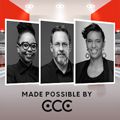#ACACaresCovid19: Unlocking value chains in smaller, transformed and Black-owned agencies
This interview is also available on YouTube, and at BizTakeouts, via downloadable App, Apple Podcasts, Spotify and IONO.FM.
For the last few weeks, the series has focused on the value being brought to the table by the South African creative, advertising and marketing sector.
Nurock, who recently launched a mentorship programme for transformed businesses, touched on the subject of transformation, particularly with regards to young entrepreneurs, and said it seems that everyone is talking about it, but questioned who is actually doing anything about it?
The biggest challenges that these agencies are facing is that they cannot get onto pitch lists... these are very creative, very entrepreneurial, young people who are running these agencies and they need to succeed to be given a seat at the table"Let's be real. Nobody expects a big client to give their entire business to a small agency. It's not going to happen and it shouldn't happen. But the thing is that there needs to be some way where it's not procurement ticking the box with the pitch consultants. It's where, maybe, there is a small portion of the budget that is put aside that actually the smaller agencies can pitch for those pieces of business. So that they can grow project by project." She said it's a collective that everybody needs to work on to try and help these small agencies drive and grow to become bigger agencies.
Nurock also said that industry bodies need to push transformation further but that there are certain clients who are giving projects to smaller, Black-owned agencies, mentioning Nedbank, DStv and Pernod Ricard. But more clients need to look at giving projects to smaller, Black-owned agencies. She suggested that some of the bigger ad agencies or groups need to collaborate with these agencies.
Setlogelo agreed with Nurock 100% and shared her experience:
"I think about the year that my business took a pivot and started scaling and growing. And that year, we had been doing projects on Unilever and began a client relationship with Nescafé. This is year three of our nine years now. You can imagine, the last six years servicing a business like Nestlé has made loads of growth, loads of opportunity for us. It's allowed us to take the work that we do into Africa. And these sort of wins are incredibly significant. Because overnight I went from almost just irrelevant and knocking down doors and not feeling seen or being visible, and not being able to contribute and just because a business like Nestlé decided to partner and work a small women-run, Black-owned agency, it completely changed the trajectory of our business."
She said the fact that Nestlé trusted them with creative, content, eventing, digital and strategy work started to bring a whole new group of clients and opportunities and started putting them in rooms they could not have accessed on their own. She said that this was very critical.
She went on to tell us that after this happened she brought in an even smaller agency, a company called Duma Collective. She said she brought them in to be their small supplier on the project. "I knew that if they get to work on Aromat, in year one of their business and if they get to work on Nestlé and Pernod Ricard and all of these fantastic brands, that six years down the line, this will be my competition. But it's the healthiest sort of competition because there is actually enough work for everyone." She said by doing this you create a sharing economy. "That is a lot more sustainable than closing doors and not making ourselves available but more importantly, clients have to be bold. They have to be bold and they have to change the status quo, and when clients take that bold step, they can insist upon it from their procurement teams, they can insist upon it from their pitch consultants."
She said that, as Nurock said, the conversation carries on but there are specific things we can do to move the needle. She said that she is a living testament to that because she's been able to empower others with the little that she had.
Nurock said: "It's about taking a risk but I also think the risk is not that big if you're giving a couple of projects to these agencies, and again, I'll stress, you don't have to give the entire business - because that is too risky - to a smaller agency but give projects or pitch projects to those agencies, and also make sure that the marketing team is more involved in the pitch process than procurement. Because what procurement is going to do is; they're going to look at the agencies and tick the boxes... On paper, those agencies are not going to tick the boxes. That's why there has to be some level of risk of going out and saying, 'Well, why don't we pitch a project to them?' And that's the way they're going to work." She reiterated that it's a collective responsibility of everybody in the industry doing their part.
Setlogelo also commented on the importance of female voices in boardrooms:
Women go through so much micro aggression. Can you imagine being in a position where you are able to influence transformation and give opportunities to others, but having your voice silenced... undermined... ignored… in the boardroom, where you’re supposed to be creating impact? Women build community wherever they go...She said we have to create spaces that support women, including corporates, pitch consultants and procurement teams, that have a community agenda to transform and to represent.
For more of Nurock and Setlogelo's learnings and insights, watch the full interview.
This industry-wide initiative for conversations around sustainable solutions to common issues facing SA’s marketers and marketeers, to future proof the industry, is made possible by the Association for Communication and Advertising.
Join the ACA at www.acasa.co.za | www.bizcommunity.com/ACACaresCovid19.
This interview is also available on YouTube, and at BizTakeouts, via downloadable App, Apple Podcasts, Spotify and IONO.FM.






































